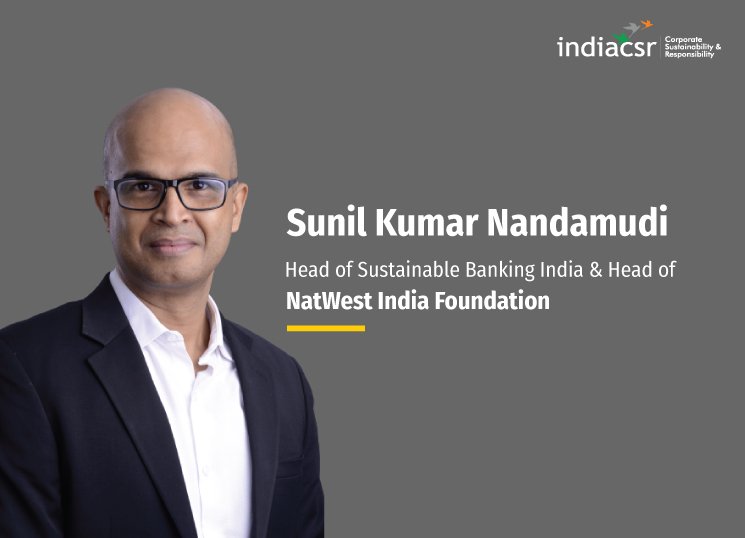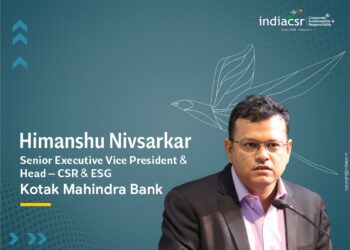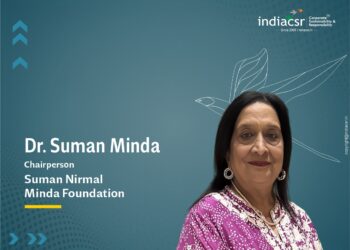NatWest Group aims to be a leading bank on climate change, and as the principal partner of the ongoing UN COP26 summit
NatWest Group India recently recognized the efforts of individuals and institutions across India who worked tirelessly to subvert by conserving and preserving the rich biodiversity of the country for a better relationship between society and nature. Sunil Kumar Nandamudi, Head of Sustainable Banking India & Head of NatWest India Foundation, spoke to Rusen Kumar, Editor, India CSR and shared his thoughts on the importance of initiating sustainable steps for organisations, the recently concluded EHA awards and the ongoing COP26. In his conversation, Sunil Kumar Nandamudi said that Natwest is committed to reaching net-zero financed emissions by 2050 and also threw light upon some of the initiatives that Natwest is taking to reach this goal. Excerpts:
How important it is for today for organisations to initiate steps to be more sustainable, have net-zero emissions, and reduce carbon footprint?
If we recognize the fact that it is our business-as-usual business of production, consumption, communication, and distribution, which are powered by energy consumption, then we acknowledge that business is the primary source of greenhouse gas (GHG) and environmental vitiation and biodiversity loss. The government can lay down multiple policies but its impact is dependent on full compliance by business, and the business itself will have to unlock creativity and technology to roll out improved ways of production, consumption, distribution, etc. This is now moving in a loop – the consumer/investor/citizen too is asking the business to demonstrate its green and clean credentials. Therefore, it is imperative on the part of the business to demonstrate good and sustainable ways of doing business and proactively support the transition to low carbon economies and remove carbon.
How is NatWest Group addressing the issues of climate change?
As a bank/provider of financial services, our carbon footprint is not very high (as compared to say manufacturing, travel, hospitality, agriculture business). We are already net zero in our operation. However, our influence on business is high through the financial instruments that we provide. We have used this power to influence two major areas – funding renewable energy on a large scale viz. GBP 20 Billion annually; and reduce the CO2 footprint from our lending operations to 50% by 2030. This is a significant initiative that entails influencing our borrowers to shift to low carbon methods and to obtain disclosures and measurements to fulfill our commitment. We have also committed to refrain from doing business with those businesses whose dependency on fossil fuels exceeds a certain level.
We have introduced a carbon tracking feature in its mobile banking app to help customers reduce the climate impact of their spending. We’ve been able to do this by partnering with fintech CoGo. We are also collaborating with Microsoft to help business customers track and reduce their emissions. To help make it simple for our customers and colleagues to move to electric vehicles, we have launched a partnership with Octopus Energy.
Helping end the most harmful activity and championing climate solutions by aligning our portfolio and lending with the ambition of the Paris Agreement, we have committed to reaching net-zero financed emissions by 2050. We have set a new target to provide £100 billion in Climate and Sustainable Funding and Financing (CSFF) to customers by the end of 2025. Our lending to the oil and gas sector in the first half of 2021 has also been reduced by £0.7bn to £3.5bn due to net repayments and the tighter lending criteria now in place for this sector.
You have recently concluded the 11th edition of the Earth Heroes Award. What was the motive of NatWest Group India to start this initiative and how has been the journey so far?
India is a mega-biodiversity country as it holds 8% of the planet’s biodiversity. Biodiversity and climate are inextricably interlinked. While oceans and forests absorb carbon and, thereby, regulate greenhouse gases (GHGs) besides fixing oxygen, fresh water, and so many other life-sustaining services; conversely, an impaired nature is playing havoc by feeding global warming further as ocean acidification and forest loss are unable to absorb our CO2 emissions.
Forests, wildlife, corals, wetlands, grasslands, etc. are all an integral part of great biodiversity, hence, these awards. In a good democratic society, it is often up to the conscious citizens to flag issues that are not going well for the wider society – the Earth Heroes are such individuals who have gone beyond their call of duty. We believe in championing potential and helping our people, communities, and businesses to thrive sustainably, we thought it is appropriate to institute these awards in India. We have had the privilege of honoring some of India’s stalwarts as well as unsung heroes who have made a difference both at policy and ground level.
How has this initiative over the past years made an impact? Any insights if you can share?
The awards are usually hosted in New Delhi (except in 2020 and 2021 when it was held virtually because of the pandemic) with wide attendance from the Ministry, Govt., Media, Scientists, Policymakers/conservation stakeholders. Good media coverage of the award winners and their causes are provided, which has enabled many award winners to earn credibility, enhance their network with stakeholders, and, thereby, enhance the scope and impact of their work. Jadav Payeng, the ‘Forest Man’ of Assam for example, was first recognized by us. Later, he received global coverage and was able to obtain more support for his work. Several frontline workers in deep forest locations have achieved recognition for their work in many states.
The Earth Heroes ‘Lifetime’ Award, given to senior persons who have carried out a lifetime’s work, has often served in reviving the fundamentals of conservation history in the country. We have recognized stalwarts like Chandi Prasad Bhat, Dr. Karan Singh, Dr. MK Ranjitsinh, and Prof. Erach Bharucha to name a few who have made an indelible impact on India’s conservation policies and ethos.
Why do you think the upcoming COP26 summit is important and how should foundations or institutes across corners help achieve the goal?
COP26 is important for several reasons – the climate is now a matter of great urgency and crisis. Several unresolved instruments can play a crucial role in the transfer of funds and technology for much-needed areas of mitigation and adaptation – viz. Article 6 of the Paris Agreement on carbon markets. There is a call for collaboration among public and private resources for achieving greater impact and for reaching out to various vulnerable corners of the planet and communities. And this is where Foundations and civil societies can play constructive roles.
NatWest Group aims to be a leading bank on climate change, and as the principal partner of the ongoing UN COP26 summit, it allows us to build powerful partnerships to help us and our customers tackle climate change; engage and educate our colleagues, and challenge ourselves to do all we can to play a leading role in this global issue at both a practical level to help our customers and at a global level to mobilise the finance services sector. Being a principal partner has stretched our climate ambitions and we have set a new target to provide £100 billion Climate and Sustainable Funding and Financing (CSFF) to customers by the end of 2025.
We will be playing a leading role at COP26 through our membership of Glasgow Financial Alliance for Net Zero (GFANZ) to mobilise private finance to tackle climate change.
We are working with policymakers, customers, businesses, and industry bodies to play our part in bringing about significant change at speed, to build a more climate-resilient economy and we will use our convening power to bring about a greener, fairer, and more inclusive economy for all.
What role do communities play in environmental conservation and climate change mitigation?
In India, the 300 million population is estimated to be dependent on forests and wetland ecosystems. There is good legislation that governs the relationship between communities and natural ecosystems. Often, there is also a conflict situation especially in the shape of human-wildlife conflict on account of crop-raiding by mega species like elephants and depredation on livestock by carnivores – an outcome of increasing human population and shrinking habitats. Urban communities too can influence pressure on such habitats through expansion of urban space, encroachments into green spaces like parks, mangroves, water drainage, and so on.
Communities are, therefore, a crucial element in conservation and climate mitigation if we can engage them constructively through consultations/education and set up/revive policy tools such as ‘Joint Forest Management’ committees, Biodiversity Management Committees, etc.
I feel that everyone can play their part in helping to tackle climate change. For instance – greening personal energy usage with solar panels installed at home and swapping to an electric vehicle; being conscious of diet and other habits; reducing/giving up on plastic usage; adopting hybrid working like working from home some days and making use of virtual meetings rather than traveling where possible.
How does NatWest engage/educate its employers and partners to contribute more towards wildlife conservation, ecological diversity, changing livelihoods, climate change, etc?
NatWest Group has an active employee volunteering program that encourages our employees to volunteer their time and skill at its forest/community projects. There are several employee networks on climate awareness and good citizen practices that are sponsored and mentored by the NatWest Group leadership but led and run by employees, such as ‘Sustainability for Future’, ‘Climate Champions’, ‘Climate Solutions Group’, etc. The NatWest Group Earth Heroes Awards are curated and executed through employee volunteers who interact and follow-up with the award winners to understand their work and the causes they work for.
(India CSR)























